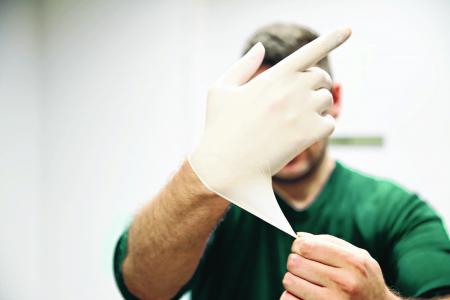Looking after 'the other end'
Dr Kevin Sng is a general surgeon, who delves deep into the recesses of the colon. He tells us about working on areas where the sun doesn't shine
How would you explain what you do to an auntie you meet only during Chinese New Year?
Hi auntie, Happy New Year. Yes, I am a doctor. Yes, I am a surgeon. No, I am not a brain surgeon. I look after the other end.
So, do you need to stick a finger up places where, as they say, the sun don't shine?
All the time. But I wear gloves. In fact, a colorectal examination is never complete without an examination up the bottom end. Doing such an examination can yield vital information - such as feeling a tumour - that may otherwise be missed.
Word association game! What is the first word that comes to mind when you hear: Hot chocolate - diarrhoea Blocked - cancer, that is causing the blockage Gas - onions
Do you manually relieve patients who are severely constipated?
Yes, with gloves. In fact, I highly recommend double or even triple gloves when doing the deed. Thankfully, it is not commonly needed. It is never pleasant, but someone's got to do it.
Is it true then that the smell sticks to your clothes, hair and even nostrils?
Apart from my fingers, I have not yet noticed the smell on my clothes, hair or nostrils. It may be a case of desensitisation. Perhaps, I'll ask my wife and I'll let you know later.
Are there perks to your job?
Many colorectal diseases may be treated with good results that are satisfying to the patient and the doctor. As a doctor, it is always a great joy to see patients happy and getting better.
Even in the case of colorectal cancer (which is Singapore's most common cancer in males and second most common in females), you would be glad to know that many of the patients are curable in the early stages of the cancer.

What about the downsides?
I occasionally see patients who have ignored their symptoms and warning signs for way too long. They often present with advanced cancer. I feel sad knowing that they could have stood a much better chance of getting cured had they sought medical attention earlier.
Do you make people describe their poop? Are they shy doing it?
That is part of my job. There are different groups of patients. There is a group, who is shy and has to be prompted extensively to get the information I need. There is another group, who is enthusiastic in describing the poop, feeding me information that is far more than what I need to know. But "more" is better than "less".
What's the weirdest experience?
Over the years, I have had to remove many unusual items that had somehow found their way into the rectum through the anus. Some of these items are quite sizeable and pose a huge challenge to remove.
One can't help but wonder how these items found their way up there. I have heard a number of incredible accounts from patients trying to explain their predicament.
I have a plea to everyone reading this: Please don't try anything like this at home.
What would you say on behalf of the colon or rectum to people in general?
Please treat me with care and concern. Eat well-balanced and healthy meals. Don't forget to include fruits, vegetables and whole grains in your diet. Seek medical attention early if you have symptoms such as blood or mucus in your stool, change of bowel habit (persistent diarrhoea or constipation), abdominal bloatedness or pain, nausea or vomiting, loss of weight and appetite.
And on behalf of the anus, I would say, "Don't wipe so hard".
Tell me a surprising fact about the colorectal system.
Everybody has "haemorrhoids" (piles). Haemorrhoids arise from blood vessels along the anus. These blood vessels are present in everybody, but people do not realise that they are there unless they cause problems like bleeding or swelling.
These vessels can swell as a result of chronic straining due to constipation. They may also swell due to compression by large structures within the abdomen, the commonest of which is the womb of a pregnant woman.
These vessels may also bleed regardless of their size. While bleeding from haemorrhoids is common, you should never assume that the bleeding must be from haemorrhoids and should see a doctor.
Get The New Paper on your phone with the free TNP app. Download from the Apple App Store or Google Play Store now

